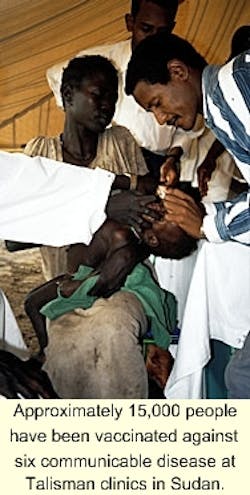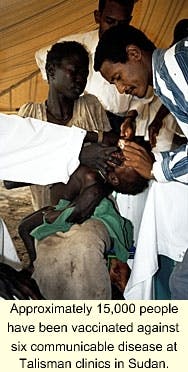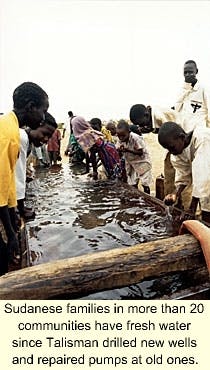Sudan experience offers corporate-responsibility lessons, opportunities
As existing hydrocarbon basins mature, the hunt for substantial new reserves often requires companies to explore and operate in less-developed countries. These may not enjoy internal peace and stability and have often not benefited from technological advances.
Parts of the world that offer some of the best potential for finding and developing large petroleum reserves are areas with barriers to entry.
Talisman Energy Inc., Calgary, has been learning just how controversial it can be to do business in Sudan, a country that has struggled with famine, internal conflict, and tribal fighting since it gained independence in 1956.
Talisman invested in Sudan 2 years ago, believing that development of this troubled country was in the best interests of both company shareholders and the people of Sudan.
Since then, the company has been surprised by the intensity of criticism directed at it for doing business in a country where civil conflict has resulted in human-rights abuses.
The degree of criticism was unexpected because oil development had proceeded there for 5 years without incident and many companies in other industries conduct business there.
Constructive engagement
Operating in countries with social and political systems different from those of western democracies requires respect of foreign cultures while preserving a company's core values.
Although companies must operate according to local laws, Talisman also works to uphold Canadian principles and international standards.
Critics argue that Talisman should withdraw from Sudan because oil revenues provide the government of Sudan with the means to escalate the conflict against opposing factions within the country. But the company believes that remaining in Sudan is the moral thing to do because its involvement there is improving life for the Sudanese.
If we withdrew, oil would continue to flow, but our influence and community development would end. Economic development leads to the promise of a better life and can be the catalyst for peace, while isolation has the most harmful impact on the poorest members of society.
The Canadian government also believes that its policy of constructive engagement is preferable to political and economic isolation.
The increased prosperity that business brings to underdeveloped countries can become a significant incentive to peace and hence to further development.
The pursuit of economically sound ventures by the private sector can be an effective tool for opening countries to new ideas, values, and influences.
Talisman feels that business has an important role to play in promoting ethical business practices and respect for human rights. The company recognizes the need to explain its position and to demonstrate the value of its contributions to Sudan.
It is now in the early stages of designing and implementing programs to help the Sudanese in consultation with the communities involved. It is a difficult process and one that has required us to learn as we go.
Talisman has also learned that it is no longer only its shareholders, employees, business partners, and local communities that have an interest in how we conduct our operations. Other groups and individuals have different perspectives that should be considered.
New stakeholders
Dealing effectively with financial, environmental, and social issues now requires companies to communicate with many groups affected by their operations. These include national governments, non-governmental organizations, international agencies, peer companies, the media, and the public.
Talisman recognizes the value of strong relationships with individuals and groups that have a stake in its operations and strives to maintain positive relationships wherever it operates.
Because social issues involve value judgments and often produce highly emotional responses, satisfactory consensus may not always be achieved. In these cases, Talisman will continue to work through discussion and other forms of positive influence to resolve differences.
Corporate responsibility
Within this framework, Talisman is undertaking corporate-responsibility initiatives that other companies may find helpful to consider if they choose to pursue opportunities in countries where social, cultural, and political factors make it is tough to do business.
There is no commonly accepted definition of corporate social responsibility, but the term generally refers to business decision making that considers ethical values with respect for people, communities, and the environment as well as compliance with legal requirements.
Last December, Talisman formally added to its existing corporate code the International Code of Ethics for Canadian Business and is now moving to implement its principles and monitor compliance with them.
The code embraces the principles of open and transparent relationships with stakeholders and respect for human rights and social justice in all operations and within our sphere of influence.
The company pledges to strive for equality of opportunity, a fair share of benefits to stakeholders affected by its activities, and not to be complicit in human-rights abuses by others.
Implementing the code involves setting and acting on proper standards of corporate behavior and taking care to avoid being political or taking on the social development mandate that properly belongs to governments.
Talisman will be the first Canadian oil and gas company to establish a management program to ensure compliance with the code and to arrange for an independent, public audit of that compliance.
This commitment placed Talisman in an emerging area with few precedents and applying the code is complicated by the fact that, having only a 25% ownership of the Sudanese oil project (see accompanying sidebar) and not being the operator, mean Talisman cannot unilaterally determine the actions of the Greater Nile Petroleum Operating Co. (GNPOC.)
Talisman created a new corporate-responsibility group to establish systems to ensure that its activities in Sudan and elsewhere comply with the code.
The group is responsible for implementing the code, preparing an annual, externally audited corporate-responsibility report on Talisman's operations in Sudan, reviewing its Sudanese community-development programs, and managing our stakeholder-engagement processes.
The company's community-development representative in Sudan has 9 years' experience with international development projects, including 4 years managing community programs during the civil war in Sri Lanka.
The corporate-responsibility group in Sudan also includes southern Sudanese familiar with the needs and concerns of the two main tribal groups living in communities within the concession area.
Advice
Talisman has also sought independent advice in creating its corporate-responsibility programs and establishing comprehensive operating principles to govern the company's conduct in Sudan.
The company has retained a University of Calgary business ethics professor to assist in corporate ethics and PriceWaterhouseCoopers to help develop management systems and procedures for measuring compliance with the international code.
The London office of PriceWaterhouseCoopers has also been engaged to conduct an independent verification of Talisman's compliance report.
Developing standards for monitoring and measuring compliance with statements of values and principles has been demanding. The values to which we have subscribed are not always open to neat and exact quantification, and there are few precedents for establishing such standards.
Only a few other resource-based companies (Shell, BP Amoco, Unocal, and Freeport-McMoran) have developed specific standards for constructive engagement internationally.
Within the industry, there is little guidance for appropriate operating principles in countries that have developing economies and are experiencing serious conflicts and human-rights violations.
International standards, such as the International Labor Organization and UN conventions, provide very little guidance for setting operating principles and every country has unique circumstances that must be considered in creating operating principles.
For operations in Sudan, a working group of Talisman managers and outside experts looked at approximately 20 different codes of conduct and international guidelines. These included those of the Interfaith Center on Corporate Responsibility, International Chamber of Commerce, Council on Economic Priorities and OECD Guidelines for Multinational Enterprises, as well as those of the UN Global Compact and the Global Sullivan Principles.
After 4 months of meetings beginning in June 2000, the working group devised an extensive set of guidelines that cover a broad range of issues, from human-rights protection, to health, safety, security arrangements, employee rights and activities of suppliers.
Operating principles
These operating principles, approved by Talisman's senior management in September, are designed to provide general guidance because every specific issue cannot be covered.
Each principle is matched with a goal and a target date for implementation. While we will see qualitative improvements over time, changes will not be immediate. We recognize that dramatic improvement will not occur within a few weeks or months and that improvements that do occur may not be immediately obvious.
In addition to establishing these comprehensive principles and arranging to have its report on compliance independently verified, Talisman has also endorsed all recommendations made to oil companies operating in Sudan by Amnesty International (May 2000).
The company has continued its dialogue with various international human-rights organizations and developed a comprehensive internal human-rights monitoring process that we are now using to investigate and document activities within the GNPOC concession area.
While we cannot require our GNPOC partners to pledge adherence to the standards to which Talisman is committed, we have presented the international code to consortium partners and the government of Sudan and advocated that GNPOC adopt a similar code of conduct.
Importance of dialogue
Talisman Pres. Jim Buckee met senior officials of the Sudanese Ministry of Energy and the presidents of both China National Petroleum Co. and Petronas to emphasize the need for the respect of human rights in Sudan and urge them to support the adoption of a code of conduct by GNPOC.
At the September meeting of the GNPOC board in Beijing, GNPOC adopted a code that includes the concept of human-rights protection.
Talisman has also promoted the need for human-rights training for GNPOC security staff. The company arranged for the four most senior security staff members to attend a human-rights training program "Free and Equal, Human Rights in Modern Peacekeeping" at the Lester B. Pearson Canadian International Peacekeeping Training Center in August.
Talisman has provided the financial support needed by Sudan's Humanitarian Aid Commission to create a conflict-resolution information database that will be used to coordinate the work of many agencies working toward peace in Sudan.
Sharing benefits
At the same time, the company takes considerable pride in the immediate, tangible benefits brought to the people of Sudan (see accompanying sidebar).
Its community development program has included five medical clinics and three schools built and equipped in the GNPOC concession area.
The largest of the clinics, a 60-bed hospital at Heglig staffed by five doctors and 15 other medical personnel, treats as many as 300 patients a day. It also provides dental and surgical services and is conducting a vaccination program that has protected more than 10,000 people from six communicable diseases.
The clinics at Paryang and Rubkona, which both treat more than 100 patients a day, are the only two facilities in Sudan's Unity state where tuberculosis treatment is available.
Talisman sends about 1.5 tons of vaccines, serums, and other medical supplies to the GNPOC concession area each month and has arranged for solar-powered refrigerators to be installed at each clinic to preserve medications.
An ambulance has been ordered to carry patients with severe illnesses or injuries to the hospital at Heglig.
The lack of clean water is another serious problem in Sudan. Talisman has drilled four deep, high-capacity water wells in the villages of Paryang, Rubkona, Dabbat, and Kummagon.
Working with the Margarite D'Amelio Children's Foundation, the company also completed an infrastructure-needs assessment covering every village close to the pipeline linking the GNPOC oil concession to Port Sudan.
This led to completion of a well maintenance and repair program that restored 28 wells and brought fresh water to thousands of people. The provision of water and medical facilities, construction of roads, and introduction of electricity have resulted in significant population growth at the main villages within the GNPOC concession.
The company's presence in Sudan also allowed it to respond quickly to a recent crisis: About 60,000 people forced from their homes and lands by fighting in the south sought refuge at Bentiu on the edge of the concession.
Talisman sent 200 large tents, mosquito nets for protection against malaria, and medical supplies to a clinic staffed by three doctors. The company also arranged to dig 100 sanitary latrines and provided veterinary medicine for treatment of an estimated 100,000 head of cattle brought along by the refugees.
These efforts and the volunteer efforts of Talisman's Sudan-based employees who work on behalf of a number of charities and self-help projects will not solve all Sudan's problems. But they do make a difference.
Looking ahead
Nearly 2 years of effort have resulted in progress and some significant achievements, but we have also experienced some of the frustrations, delays, and disappointments that come with trying to progress these initiatives.
And, the company has made some mistakes that we hope to learn from as we begin planning the Sudanese community-development programs to be implemented in 2001.
We will continue to focus on water, health, and education projects along with efforts to help increase the capacity of local, national, and international community-development agencies to operate long-term programs that benefit Sudan.
The company is now examining a variety of proposals aimed at increasing labor market and business skills and assisting with the development of small businesses and agricultural.
We continue to learn as we go. Our experience to date has clearly shown that flexibility and a willingness to adapt our plans to both changing circumstances and local practices are essential.
Our experience also shows that dedication to a policy of constructive engagement has made a significant difference in Sudan and offers the best hope of improving economic and social conditions in less-developed countries.
This approach not only provides employment and other traditional economic benefits, but is also an effective means of encouraging ethical business behavior, the peaceful resolution of disputes, and respect for human rights.
It's not an instant cure-all, but it has allowed Talisman to begin helping to make a difference in Sudan.
The authors-
Jacqueline Sheppard is vice-president, legal and corporate projects, of Talisman Energy Inc., Calgary. She earned an honors degree (1977) in political science from Memorial University of Newfoundland, then attended Oxford University as a Rhodes Scholar where she received her Honors Jurisprudence BA and MA (1979). She was awarded an LLB (1981; first class honors) from McGill University and practiced law with Blake Cassels & Graydon, Calgary, before joining Talisman in 1993.
The GNPOC project
Talisman Energy Inc. became involved in Sudan through the 1998 purchase of Arakis Energy Corp. That acquisition gave Talisman a 25% interest in the Greater Nile Petroleum Operating Co. (GNPOC), which holds a concession to develop about 12 million acres in central Sudan.
The project is now producing about 180,000 b/d of oil.
Partners in GNPOC, which also built and operates a 1,000-mile pipeline from the concession area to a marine terminal at Port Sudan, are the China National Petroleum Co. (40%), Malaysian national oil company Petronas (30%), and Sudanese national oil company Sudapet (5%).





